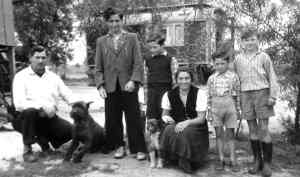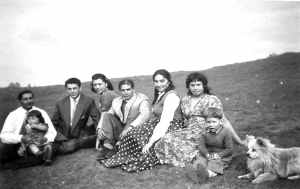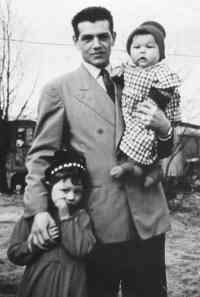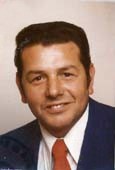Childhood
I was born in
Groß Sittensen, near
Hamburg,
on
19 November 1928. We were six children.
Maria, born in
1920, was the eldest.
Helmut, born in
1930, was the youngest. We lived in
Hamburg-Harburg. In
1934, when I was six years
old, my family settled their caravan on the site at
Wasmerstraße 15.
These were happy times. We didn't have much money but we children swam in the river Seeve or ran to
the
Knusperhäuschen, a bakery in the
Lüneburger Straße,
where we bought a bag of cake leftovers.
 |
| Weiss Family #1 |
My father was a musician and played in restaurants and at festivities. In
1937
his trade licence was taken from him. Sinti were no longer permitted to pursue their freelance occupations.
Until his arrest and incarceration in
Sachsenhausen concentration camp in
1938, my father was employed by various building firms in
Harburg. In
June 1938, for no reason
at all, he was imprisoned at
Sachsenhausen. I later learned that
Himmler had ordered that at least 200 people should
be arrested and imprisoned from every district. And as my father was a Sinto he was one of those
arrested. Total madness. Our mother did not inform us children of this as she did not wish to
burden us. She told us that father was travelling and that he would soon return. He was in
Sachsenhausen for several weeks but then returned to
Hamburg. I knew nothing of this. Only
much later did he tell us where he had been, how terrible it was, and of the hunger he had suffered.
In
1934 I began school in the
Kapellenweg in
Harburg. School was fun. I enjoyed learning and had
many school friends. Suddenly, in
1939, I had to leave my school and go to another.
I didnít understand why and wished to remain in my school. My mother even went to the head teacher to
ask if I could stay in his school in
Kapellenweg. But all "Gypsies" were to
be concentrated in an extra-class in one school. We were to be separated from the so-called "Aryan" children.
I, and all the other Sinti children, had to attend the
Maretstraße school
where over 30 children of all age groups were put into a class together. These other children came from various
neighbourhood schools. We were girls and boys from the first to the eighth class all together. Our teacher was
a Hillebrand who showed little regard for us. We were often set the same work irrespective of
whether we were in the first or eighth class. But the worst was that we were no longer allowed
to speak to the "Aryan" children. These children were forbidden to talk to us "Gypsies" and we
were strictly forbidden to talk to them. There was even a chalk line drawn in the schoolyard. We
were separated from the other children. We were also forbidden to talk to them on the way home.
We were closely observed.
Deportation
And then the
16 May 1940 arrived. At 4 a.m. our caravan site was cordoned off
by the police. They
turned us out of bed; we had to immediately get dressed and ready to depart. They told us we were
to be resettled and that we were to be given beautiful houses in Poland. They loaded us onto
lorries. The adults immediately considered it wise to take as much clothing as possible. We put
on one layer of clothing over another. We were taken to the police station in
Nöldeckestraße. Here we were assembled and taken to the
Hamburg free port, to a fruit warehouse.
This was a huge room roughly 50x30 m. Here we only had the bare floor to lie on. We were registered.
We had to hand over our identity cards and valuables. Watches, rings and other valuables were
collected. The children, even the older children, had to completely undress and were searched
for anything secreted on their bodies. This was very embarrassing for the elder children.
 |
| Weiss Family #2 |
Finally, on
20 May, we were loaded onto goods wagons. The train departed from the
goods station not far from the fruit warehouse. This lay in the free port area south of the central railway station.
It was the
Hannoversche Station from where the deportation transports departed
Hamburg.
There were a great number of people and the wagons were terribly over crowded. Today, I know that there
were almost a thousand people, over half of whom from
Hamburg. Others came from
different places in North Germany.
Scepticism was expressed by the adults when we saw the police escort on the train. They asked why there
was a police escort when we were simply being resettled, and were to be given houses. Many had not
believed this story from the start. And when the wagon doors were locked shut for the majority it was
clear that this didn't tally. Each wagon had a two policeman escort. The wagons were pulled by a
steam engine which had to regularly take on water. Then the women immediately cried out for water for
the children because there was hardly any water in the wagons and worst of all no toilets.
Belzec und Krychow
I believe we were three days and two nights under way before we arrived in
Belzec.
We detrained here. We were met by the commandant, a
SS-Hauptsturmführer mounted on a horse. That
relatively short man presented himself to us, and said:
"
From now on you are all my prisoners. I am going to draw a line
here. Anyone who crosses this line will be shot."
The men had to work days on end erecting the perimeter fence, inside this line. We had to erect this barbed wire
fence and fence ourselves in. Can you imagine this?
 |
| Gottfried Weiss and his Children |
We were housed in a large barrack, roughly 100 metres long. There was straw on the floor and we had
to find a place here. It was only possible to lie on the floor. 70 children died within the first
two weeks. There was no doctor and no sanitary facilities. Later we had to build such facilities
ourselves. One morning I saw how an SS man had a young girl buried alive. She was very ill.
He said:
"
When I say she is dead then she is dead!"
She was thrown in a pit and when sand was thrown over her legs she moved them. I saw this with my own eyes.
Every afternoon a wagon arrived with water. This was a wagon with which the farmers sprinkled their
fields. We all assembled to collect water. Directly next to me someone was shoved and fell against
an SS man. The SS man drew his pistol and shot the man. Bleeding from his wound he walked a few
steps before women went to his assistance. Another SS man shot them in the back. Many were also beaten.
We were given food. In the afternoon we received a little soup. In comparison to
Bergen-Belsen it wasnít so bad. We received practically nothing in
Bergen-Belsen, only a half litre soup a day. In
Belzec it was bearable. Our hunger was not satisfied but we got by.
When I think of this today I feel such sorrow for our parents because they gave us practically their
entire ration.
We were in
Belzec as a family. From there we were taken to
Krychow. This was a former prison.
On arrival an uncle of mine was shot because he had set a foot outside the fence in order to pick
up something that lay there. He lived three days before dying from tetanus. Many were maltreated
in this camp too.
Warsaw
In the
Warsaw Ghetto women and girls were separated from men and boys. We
were in the
Gänsegasse Street.
One day a policeman gave my uncle and me a tip because he recognised us as being from
Hamburg. He helped us flee the ghetto. We quickly packed our belongings.
My brother
Helmut was very ill at this time. He died shortly thereafter. But
we all escaped. The police let us out. We were caught the following day. But our lives had been saved. They took
us to another camp in
Klettendorf, near
Breslau, where munitions were manufactured. This camp was evacuated when the
Russians drew nearer.
We came to
Liegnitz. That was further to the west. From here we were taken to
Bergen-Belsen. That was a very long journey again in goods wagons.
Bergen-Belsen was the worst camp of all. Even today I cannot believe
we survived this. The camp commandant was
Kramer. He was the former camp commandant
of
Auschwitz. He randomly shot people. It was unbelievable how many
people he shot. Today I know that between the beginning of
January 1945 and
mid April 35,000 people died in
Bergen-Belsen
concentration camp.
There was another camp after
Krychow but the worst of all was the
Warsaw Ghetto. We arrived here in
1943. Today I describe this as a sign from God. I am a man of faith. I thought to myself
there must be an explanation as to why we have had so much good fortune. We were allotted a room where there were
already 40 or 50 people. There was hardly room to lie down. I heard from someone that young people were
being sought for particular work for which they were to receive 250 grams bread. We reported and were
given a two wheeled cart. The size of a vegetable cart. We had to collect the corpses of children.
We collected around 30 corpses from the street daily. They were buried in a mass grave. We received
250 grams bread for this work each evening. I witnessed such terrible things.
Bergen-Belsen
We arrived at the ramp in
Bergen-Belsen (Germany). That was a short distance
outside the camp. We were detrained in the night and had to walk roughly a kilometre. We stumbled over what we
thought were sacks. They were not sacks but corpses. It took us the entire night to reach the camp.
There lay so many dead on route.
Years later I returned to
Bergen-Belsen concentration camp memorial to see the
site once more. My mother did not wish to be remembered of these times.
 |
| Gottfried Weiss |
When the English soldiers arrived, food was suddenly available, but my mother warned us:
"
Donít eat too much." And that was a good advice as our stomachs were no longer
able to digest normal food. Many died after having eaten too quickly and too much. The body was no longer
able to digest this. Many tried to open the tins of food the Red Cross brought with their teeth. They naturally
injured themselves.
It was most terrible in
Bergen-Belsen. We were lucky wearing clothes now. Some
were nearly naked. They immediately took the clothes from the corpses. I also saw a wagon arrive with totally
emaciated Russian prisoners.
Many of the SS fled when the English arrived. Some were arrested. Those that fled dressed
themselves in prisoner uniforms before fleeing. Despite this many were caught and later sentenced;
some being condemned to death.
I hope that such times do not return and that people do not forget. We had unbeleavable good
fortune as my parents and five of us six children survived five years in various concentration camps.
I am thankful to God for this.
Gottfried Weiss died in
March 2003 at the age of 74.
Karin Guth recorded this interview at his house in
Hamburg-Harburg on
1 July 2002.
Source: Karin Guth, Hamburg
Thanks to
Struan Robertson
for translation.
© ARC 2005










